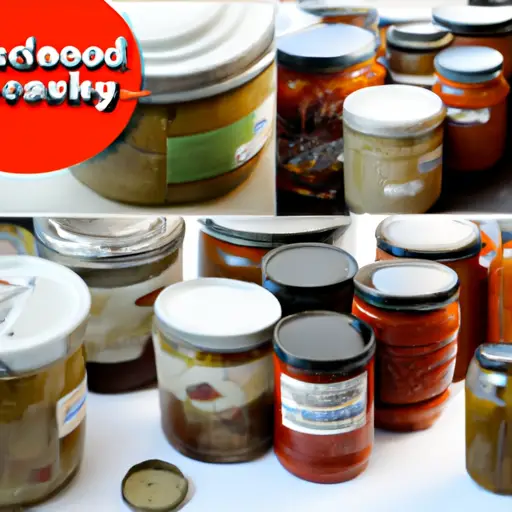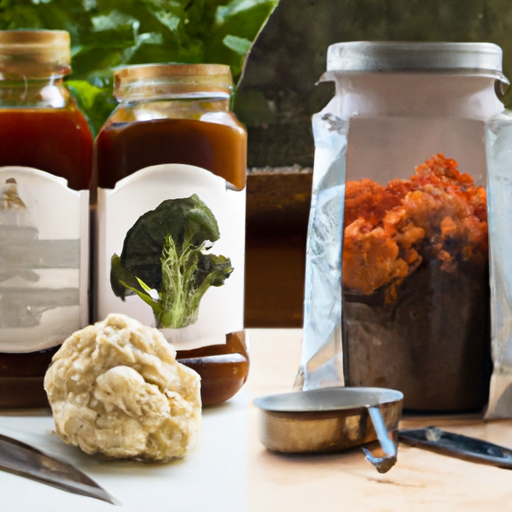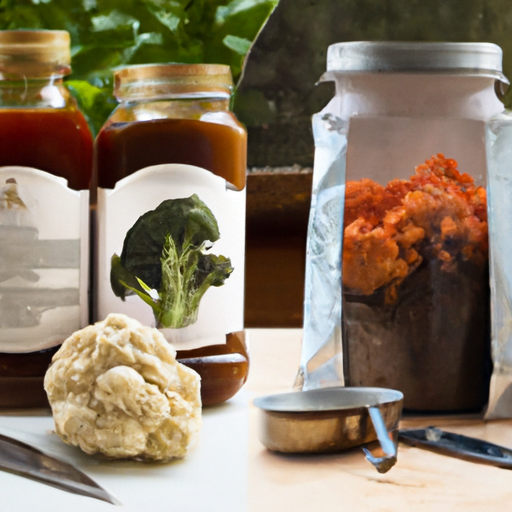So, you’re interested in off-grid living? That’s awesome! It’s an amazing lifestyle choice that allows you to disconnect from the hustle and bustle of the modern world. But let me ask you something, have you ever wondered about the importance of food preservation in off-grid living? It may not be something that immediately comes to mind when you think about the perks of living off the grid, but trust me, it’s essential.
When you’re living off the grid, you’re often far away from grocery stores and other sources of fresh food. That’s where food preservation comes in. It allows you to store and keep food for extended periods of time, ensuring that you have a steady supply of nourishment. Whether you’re growing your own fruits and vegetables or hunting for meat, being able to preserve your harvest will prevent wastage and ensure that you have enough food to sustain yourself throughout the year.
Alright, so let’s dive into the specifics. There are five key reasons why food preservation is crucial in off-grid living. First and foremost, it helps you to minimize food waste. By preserving your food, you can extend its shelf life and reduce the chances of it spoiling before you can consume it. This saves you money and resources, and it’s also a sustainable practice.
Secondly, food preservation allows you to enjoy seasonal produce all year round. Imagine picking fresh strawberries during the summer and being able to enjoy them in the dead of winter. Preservation methods like canning and freezing make this possible. You can store your favorite fruits and vegetables when they’re in abundance and enjoy them when they’re out of season.
But wait, there’s more! Food preservation also helps you to maintain a varied and balanced diet. By preserving different types of food, you can have a diverse range of options to choose from throughout the year. This ensures that you’re getting all the necessary nutrients your body needs, even in an off-grid setting. Plus, it adds a bit of excitement and flavor to your meals!
Now that you understand the importance of food preservation in off-grid living, stay tuned to learn about different preservation methods and tips to make the most of your off-grid lifestyle. Trust me, you won’t want to miss out on these valuable insights!

The Importance of Food Preservation in Off Grid Living
Off grid living is a lifestyle choice that involves being completely self-sufficient and disconnected from mainstream resources such as electricity, water, and food supply. It is a way of life that allows individuals or families to live in harmony with nature and reduce their environmental impact. However, off grid living comes with its own set of challenges, especially when it comes to food preservation. In this article, we will explore the significance of food preservation in off grid living and discuss the various methods and considerations for preserving food in this unique lifestyle.
Understanding Off Grid Living
Off grid living refers to living in a self-sufficient manner without relying on external resources. It typically involves generating your own electricity through solar panels or wind turbines, collecting rainwater for daily use, and growing your own food. This lifestyle requires careful planning and consideration of every aspect of daily life, including food preservation.
Challenges of Off Grid Living
Living off the grid poses certain challenges when it comes to food preservation. Without access to electricity or conventional refrigeration, it can be difficult to ensure a long-term food supply. Additionally, off grid living often means limited storage space, which can further complicate the preservation process. Proper food preservation is essential to minimize waste, maintain nutritional value, and ensure food safety and hygiene.
The Significance of Food Preservation in Off Grid Living
Effective food preservation plays a crucial role in off grid living for several reasons:
Ensuring Long-Term Food Supply
One of the main challenges of off grid living is ensuring a reliable and long-term food supply. By preserving food, you can extend the shelf life of perishable items and reduce the chances of running out of food during periods of scarcity. Preserving food allows you to stock up on essentials and be well-prepared for any unforeseen circumstances.
Minimizing Food Waste and Spoilage
Food waste is a significant problem in today’s society, and off grid living presents additional challenges in this regard. Without access to regular grocery stores, it is essential to make the most out of the food you have. Food preservation techniques such as canning, freezing, and dehydrating help to minimize waste and prevent spoilage, allowing you to enjoy the fruits of your labor for longer periods.
Maintaining Nutritional Value
Preserving food not only extends its shelf life but also helps to maintain its nutritional value. When you grow your own food or source it locally, you have control over its quality and freshness. By preserving fresh produce, you can lock in its nutrients and enjoy a healthy and well-balanced diet even in the absence of a regular food supply chain.
Safety and Hygiene Concerns
Off grid living often involves relying on alternative food sources, such as homegrown produce or locally hunted game. While this can be exciting and fulfilling, it also comes with certain safety and hygiene concerns. Food preservation methods such as canning, pickling, and smoking are essential for ensuring the safety and hygiene of your food supply, reducing the risk of foodborne illnesses.
Reducing Reliance on External Sources
A fundamental principle of off grid living is reducing reliance on external sources. By preserving your own food, you become less dependent on regular grocery stores and the industrialized food system. This not only provides a sense of self-sufficiency but also helps to minimize your ecological footprint by reducing the transportation and packaging associated with store-bought food.
Methods of Food Preservation
There are several methods of food preservation that are well-suited for off grid living. Each method has its own advantages and considerations, and the choice of preservation method depends on factors such as available resources, food type and quality, space and storage constraints, and energy efficiency. Some of the common methods of food preservation include:
Canning
Canning is a popular method of food preservation that involves bottling food in glass jars and heat processing them to kill bacteria and prevent spoilage. This method is suitable for preserving fruits, vegetables, jams, sauces, and even meats. It allows for long-term storage without the need for refrigeration.
Freezing
Freezing is a simple and effective method of food preservation that involves storing food at sub-zero temperatures. It is particularly useful for preserving fruits, vegetables, meat, seafood, and prepared meals. However, freezing requires a reliable power source, which can be a challenge in off grid living unless you have access to alternative energy systems.
Dehydrating
Dehydrating is a method of removing moisture from food to prevent spoilage. It involves air-drying or using a food dehydrator to remove water content. Dehydrated foods have a long shelf life and can be rehydrated when needed. This method is suitable for preserving fruits, vegetables, herbs, and meats.
Fermenting
Fermentation is the process of using microorganisms such as bacteria or yeast to convert sugars in food into alcohol or acids. This method not only helps to preserve food but also enhances its flavor and nutritional value. Fermenting is typically used for preserving vegetables, fruits, dairy products, and beverages such as kombucha or kefir.
Salting and Smoking
Salting involves coating food with a layer of salt to draw out moisture and inhibit the growth of bacteria. It is commonly used for preserving meats, fish, and certain vegetables. Smoking, on the other hand, involves exposing food to smoke from burning wood or other aromatic materials. The combination of salt and smoke helps to preserve and flavor the food.
Pickling
Pickling involves submerging food in a solution of salt, vinegar, and spices to create an acidic environment that inhibits bacterial growth. This method is commonly used for preserving vegetables, fruits, and condiments. Pickled foods have a tangy and distinctive flavor that adds variety to meals.
Vacuum Sealing
Vacuum sealing involves removing air from a package before sealing it, creating a vacuum environment that inhibits the growth of spoilage microorganisms. Vacuum-sealed foods have a longer shelf life and can be stored at room temperature. This method is suitable for preserving a wide range of foods, including fruits, vegetables, meats, and dry goods.

Choosing the Right Preservation Method
When it comes to choosing the right preservation method for off grid living, several factors should be taken into consideration:
Consideration of Available Resources
Off grid living often means limited resources, including energy and space. It is essential to choose preservation methods that are compatible with your available resources. For example, if you have ample solar power, freezing and refrigeration might be viable options. If energy is more limited, dehydrating and canning may be more practical.
Food Type and Quality
Different preservation methods are suitable for different types of food. You should consider the type of food you want to preserve, its quality, and how long you want it to last. Some foods are better suited for canning, while others may be more suitable for freezing or dehydrating.
Space and Storage Constraints
Off grid living often involves limited storage space. It is important to consider the amount of space available and choose preservation methods that can be accommodated. Canning and vacuum sealing can be space-intensive, while dehydrating and fermenting require less space.
Energy Efficiency
Energy efficiency is a key consideration in off grid living. Since resources are limited, it is important to choose preservation methods that are energy-efficient. Methods such as canning and vacuum sealing require relatively high energy inputs, while dehydrating and fermenting require less energy.
Ensuring Proper Food Handling and Storage
In addition to choosing the right preservation method, proper food handling and storage are essential for maintaining the quality and safety of preserved food. Here are some important considerations:
Cleaning and Sanitizing
Before starting the preservation process, it is crucial to thoroughly clean and sanitize all utensils, equipment, and containers. This helps to prevent the growth of harmful bacteria and ensures the longevity of preserved food.
Proper Packaging and Labeling
Proper packaging is essential for preserving food. Choose appropriate containers that are airtight, moisture-resistant, and free from contaminants. Label each container with the date of preservation and the contents to easily track and rotate your stock.
Maintaining Optimal Storage Conditions
Preserved food should be stored in optimal conditions to maintain its quality and safety. This typically involves storing food in a cool, dry, and dark place away from direct sunlight and extreme temperatures. Consider using root cellars, coolers, or insulated storage areas to maintain a constant temperature.
Utilizing Modern Technology for Food Preservation
While off grid living is often associated with traditional and low-tech methods, there are modern technologies available that can enhance the food preservation process. Incorporating these technologies can help overcome some of the challenges associated with off grid living. Here are a few examples:
Solar-Powered Refrigeration
Solar-powered refrigeration systems use solar panels to generate electricity, which is then used to power an energy-efficient refrigerator or freezer. These systems are ideal for off grid living as they allow for reliable refrigeration without the need for grid electricity.
Efficient Water Bath Canning Systems
Water bath canning systems are designed to simplify the canning process and make it more energy-efficient. These systems use less water and require less time to heat up, reducing the overall energy consumption. They are a convenient option for off grid living where energy resources need to be conserved.
Digital Food Dehydrators
Digital food dehydrators allow for precise control over temperature and drying time, resulting in optimal dehydration and preservation of food. They are energy-efficient and can accommodate a variety of fruits, vegetables, and meats. Digital controls ensure consistent results and reduce the risk of spoilage.
Automatic Vacuum Sealers
Automatic vacuum sealers make the process of vacuum sealing food quick and easy. They remove air from the packaging and seal it automatically, ensuring an airtight environment and prolonging the shelf life of preserved food. These sealers are particularly useful for off grid living, where energy resources should be optimized.
The Economic and Environmental Benefits
In addition to the practical advantages of food preservation in off grid living, there are also economic and environmental benefits:
Reducing Grocery Expenses
Preserving your own food allows you to save money on groceries. By growing your own produce and preserving surplus harvest, you can significantly reduce your grocery expenses and become more self-reliant.
Minimizing Food Transportation and Packaging
The industrialized food system relies heavily on transportation and packaging, which contribute to carbon emissions and waste. By preserving your own food, you decrease the need for these processes, thereby reducing the environmental impact associated with food transportation and packaging.
Decreasing Food Loss and Waste
Preserving food helps to minimize food loss and waste. By properly preserving and utilizing all parts of the food, you can reduce the amount of food that ends up in the landfill, contributing to a more sustainable and efficient food system.
Lowering Carbon Footprint
Off grid living is inherently environmentally friendly, and food preservation plays a role in reducing the overall carbon footprint. By preserving food at home, you avoid the energy-intensive processes associated with commercial food production, storage, and transportation, resulting in lower greenhouse gas emissions.
Food Preservation as a Skill and Lifestyle Choice
Food preservation is not only a practical necessity in off grid living but also a valuable skill and lifestyle choice. Here are some reasons why:
Preserving Tradition and Cultural Heritage
Food preservation techniques have been practiced for centuries and play an important role in preserving culinary traditions and cultural heritage. By learning and practicing these techniques, you can connect with the past and keep alive the knowledge and skills of your ancestors.
Self-Sufficiency and Resilience
Preserving your own food provides a sense of self-sufficiency and resilience. It allows you to rely less on external systems and become more self-reliant. By mastering the art of food preservation, you gain the ability to sustain yourself and your family in times of scarcity or emergencies.
Exploring New Flavors and Recipes
Preserving food opens up a world of flavors and culinary possibilities. By experimenting with different preservation techniques, you can create unique flavors and try new recipes. Preserved foods often have distinct tastes and textures that can add variety to your meals.
Building a Sustainable Future
Food preservation is a sustainable practice that aligns with the principles of off grid living. By preserving your own food, you contribute to a more sustainable and resilient food system. You reduce waste, minimize resource consumption, and promote a healthier relationship with the environment.
Common Mistakes to Avoid in Food Preservation
While food preservation is a valuable skill, there are certain mistakes that should be avoided to ensure the safety and quality of preserved food:
Insufficient Food Preparation
Proper food preparation is crucial for successful preservation. Failing to wash, peel, seed, or blanch produce before preservation can lead to spoilage or loss of quality. Take the time to prepare and process the food correctly to achieve optimal results.
Improper Sterilization and Sealing
When canning or vacuum sealing food, it is essential to ensure proper sterilization and sealing of containers. Failure to sterilize equipment or improperly sealing jars or bags can introduce bacteria or air, leading to spoilage or compromised safety.
Lack of Monitoring and Rotation
Preserved food should be regularly monitored for signs of spoilage or degradation. As off grid living often means limited resources, it is especially important to rotate your stock and consume the oldest preserved items first to prevent waste.
Using Low-Quality Preservation Equipment
Investing in high-quality preservation equipment is essential for successful food preservation. Using low-quality jars, equipment, or sealers can compromise the effectiveness of the preservation process and lead to decreased shelf life or safety of the preserved food.
Conclusion
The importance of food preservation in off grid living cannot be overstated. It is a vital skill that ensures a long-term food supply, minimizes waste, maintains nutritional value, and promotes self-reliance and sustainability. By understanding the different preservation methods, considering available resources, and utilizing modern technologies, off grid individuals and families can successfully preserve their own food and embrace a wider range of food options. Food preservation is not only a practical necessity but also a lifestyle choice that connects us with tradition, promotes resilience, and builds a more sustainable future. So, take the time to learn and practice the art of food preservation, and enjoy the benefits it brings to your off grid living.




